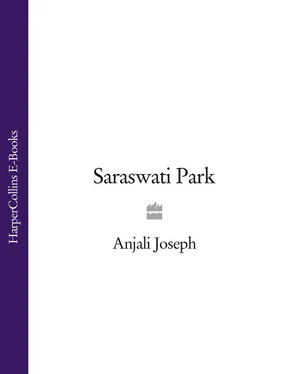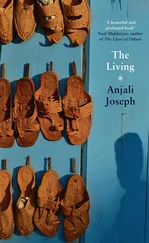Ashish rubbed his eyes, turned off the fan, and went into the living room, from where he could hear voices.
‘Tea?’ His aunt came out of the kitchen and smiled at him.
‘Hm.’
He sat down, still half immersed in the dense warmth of afternoon sleep, and peered at his aunt and uncle. Mohan was drinking a steaming cup of tea and reading the newspaper. Ashish leaned his elbow on the edge of the table and allowed himself to re-enter the world.
‘Here.’ Lakshmi mami put a cup in front of him. He recognized it: it was tall and had a blue handle; a fey character called Little Boy Blue danced about on the front. All his cousins and sometimes he had been force-fed milk with protein powder in this cup, in the belief that it would make them strong.
Mohan grunted and folded the newspaper.
‘Anything interesting?’ Ashish asked.
‘Nonsense,’ said Mohan dispassionately. He brightened. ‘Shall we go for a walk?’ Ashish smirked; he recalled this meant his uncle wanted to visit the snack shop at the edge of the market, and buy hot samosa.
‘Let him finish his tea at least,’ Lakshmi mami intervened.
Ashish immediately adopted a hangdog expression and put the cup to his mouth. ‘It’s hot,’ he whimpered, making for the television. He found the remote, put on a music channel, and began to watch the video of a new song that blared, cancelling out the birdsong and the cries of the cricketers outside.
‘No hurry,’ said Mohan. He got up and began to drift around the living room in a conspicuously bored way.
The last light was golden, like something in a film; it fell carelessly across the dusty leaves of the old banyan in the empty plot, here and there picking out the new, shiny green ones. Television aerials cast extravagant shadows.
A chubby, frizzy-haired girl whom Ashish thought he recognized was pretending to walk for exercise. She dawdled down the lane, her mobile pressed to her ear.
‘I know,’ she said into the phone. ‘Seriously!’
As they passed, she smiled at both of them, and Mohan reached out and patted her head with the flat of his hand.
‘Madhavi, Dr Gogate’s daughter. Do you remember her?’ he asked Ashish quietly.
‘She used to be a little fat girl?’
‘Well, a little healthy maybe.’
‘That’s exactly what he said!’ Madhavi said. Her voice followed them for a yard or two after they rounded the corner. They crossed the small roundabout, where Ashish saw two stray puppies play-fighting, rolling in the dirt next to a heap of rubbish.
‘We’ll go to Matunga one Sunday for dosa if you like,’ Mohan said.
‘Mm,’ Ashish agreed. He had changed into his Sunday clothes, a t-shirt and shorts made comfortable from much washing. The evening air was soothing on his skin.
‘Your parents will reach this evening, we can call them when we get back.’
‘Okay.’ He scuffled along. He didn’t miss his parents; he wasn’t sure if he would. But already he missed town: on a holiday like today, outside Esplanade Mansion the streets were as quiet as the inside of a cup, and at such times the city always seemed to belong to him alone.
‘So,’ Mohan cleared his throat, ‘college doesn’t start for a month, a little more than a month?’
Ashish’s ears pricked up at the mention of college, but he kept his head prudently down. ‘Yes, in June,’ he said.
‘Ah. Hm.’
They continued to amble along the second lane, where the bungalows and apartment blocks were low-rise and set back from the road. Next to a broken culvert, bright green weeds flourished illegally.
‘Your parents were surprised about your attendance record,’ Mohan said.
Ashish looked at him. Mohan looked away, and waved at an unattractive grey bungalow on the left. The gatepost was marked Iyer. ‘Famous doctor lives there,’ he remarked. ‘Heart surgeon. Son is also a doctor. Dermatologist.’
‘Hm.’
Mohan frowned. ‘I don’t want to lecture you about your studies,’ he said. Ashish, holding his breath, flapped on in his rubber slippers. A rickshaw, containing two laughing young people, went past; the exhaust made explosive, farting noises.
‘It’ll be nice for all of us if you have a good year,’ Mohan said finally. He sighed, laughed, and pulled Ashish closer to him so that he could perform a familiar manoeuvre of affection and exasperation: he put his left hand on Ashish’s head and clouted it with his right. This was the only punishment he’d ever managed to inflict when his children, nephews and nieces reported each other’s misdemeanours to him.
Ashish grinned, but not too much. ‘Yes Mohan mama, don’t worry,’ he said obligingly.
His uncle snorted. ‘You have no idea. You should have heard your grandfather talk about studies, doing well at school…Vivek mama had it worse than I did, of course.’ He smiled.
They were passing a dilapidated beige bungalow. ‘He used to write, your grandfather,’ Mohan said suddenly. ‘Did you know that?’
‘No,’ Ashish said. His uncle was smiling, as though he had pulled a forgotten rabbit out of an old hat. ‘Do you mean stories?’
‘Stories, essays, little things. I don’t know what you’d call them. On Sundays he would get up early in the morning. When we woke up, he would be writing and he’d carry on all day.’
‘So he didn’t take you all out, you didn’t do things?’
‘It was his writing time.’
Ashish tried to digest this image of his grandfather, whom he mostly knew from photographs; there, he seemed like a grimmer, more stolid edition of his uncle: white shirt, trousers worn somewhere around the nipples, those small spectacles, slicked-back hair. ‘Did he publish anything?’ he asked.
‘No. One of his friends was a writer of short stories, a very clever fellow, Nandlal Gokhale. My father showed Gokhale some of his stories once and he took them away to read. But he said that they weren’t good enough to publish.’
Ashish frowned. ‘But I’ve never heard of this Gokhale.’
‘He’s not so well known now,’ Mohan said.
‘So how does anyone know that he was right about grandfather’s writing?’
Mohan’s pace seemed to slow. ‘Well – he was a man of letters,’ he said.
Ashish was still mildly indignant. ‘Do you have any of grandfather’s stories?’ he asked, though he was a slow and reluctant reader of his mother tongue.
Mohan shook his head. ‘No, re. It’s possible that there were some papers and they got lost when we left the house at Dadar. But I think he burned them, some time before he died.’
Later in the evening Ashish was sitting at his desk when there was a knock at the door. His uncle came in. ‘Your aunt says dinner’s ready,’ he said. ‘Come soon. Oh – you found this book.’ He wandered further into the room and picked up Become a Writer .
‘Yes, what is it?’ Ashish asked. ‘I haven’t really looked at it, I started these ones.’ He pointed to the pirated copies of I’m OK, You’re OK and The Silva Method . They were near-perfect facsimiles, but their thin paper and flimsy covers made them seem interestingly insubstantial, as though they belonged to a more temporary world to which they would one day return.
‘I bought this a few years ago, from a man sitting outside the Museum,’ Mohan said slowly. ‘He was next to the other hawkers, you know, the comb-and-keychain guys. But all he had was three peacock feathers and this book, in the same state as now.’
‘How much did you pay?’
‘I don’t remember. Too much. I didn’t bargain, he seemed in a bad way.’
From the other room came the cry, ‘It’s getting cold!’
‘Come on,’ Mohan said.
Ashish scrambled up, and stuck a ruler in his textbook. He had the disconcerting feeling that someone with immense, vacuum-black eyes had stared at him for a moment from the darkened window of the empty flat opposite.
Читать дальше












